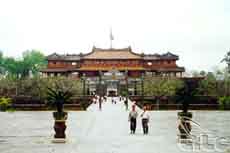All major monuments of Nguyen Dynasty in the former feudal capital city of Hue and its surrounding areas will be fully restored by 2020 under a plan announced by the People's Committee of Thua Thien-Hue Province.
 All structures of the Forbidden City, the homes of kings and royal families that were once off-limits to the common people, will be restored according to their original architecture and designs.
All structures of the Forbidden City, the homes of kings and royal families that were once off-limits to the common people, will be restored according to their original architecture and designs.
The restoration of Thai Hoa Palace, or the Palace of Heavenly Peace, where coronations and the court's premier ceremonies took place, hallways in the Forbidden City, mausoleums dedicated to Kings Thieu Triand Dong Khanh, among others, will be completed by the end of next year.
From then until 2017, work will be carried out on the Can Chanh Palace where kings held court; the Phung Tien Palace which houses altars worshipping the Nguyen Kings; the left and right wing pavilions of Thai Hoa Palace; mausoleums of kings Gia Long and Thieu Tri; and the Tinh Tam (Peace of Mind) Lake.
The Can Thanh Palace, where kings had meals and slept, and the Khon Thai Palace, home of queens and senior concubines, and the Ngu tien van phong (King's Office) as well as the system of walls and gates of the Forbidden City will be restored between 2017 and 2020.
Other structures outside the Forbidden City, like the Kham Thien Giam (court's observatory and meteorological agency), Nam Giao Platform where kings worshipped Heaven, mausoleums dedicated to Tu Duc King and Nguyen Lords (ancestors of Nguyen Kings), and waterways in the feudal city will also be restored by 2020.
The plan will also give a facelift to natural landscapes around the monuments and relocate residents who have encroached into monument areas. The restoration of intangible cultural values, preservation of traditional handicrafts and training the next generation of artisans are also envisaged in the plan.
Total investment for the restoration and preservation works will exceed VND2.5 trillion (US$120 million), according to Nguyen Minh Bieu, director of the project's managing board.
He said the project is part of a 10-year (2010-2020) conservation plan prepared by the central Government for the former feudal capital of Hue, he said.
Around 20 sub-projects have been approved so far and some of them have already begun implementation. Another 27 other sub-projects are at the formulation stage.